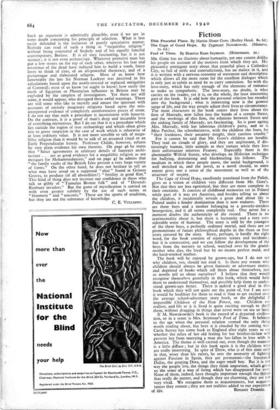Fiction
Fool of Tlme. By Beatrice Kean Seymour. (Heinemann. 9s.)
MR. GORE has no illusions about humanity, yet one cannot dislike his people on account of the motives from which they act. His pleasantly astringent story about that peaceful place a Cathedral City, so full of strife and contradictions, has no malice in it, and it is written with a nervous economy of statement and description which allows all the more room for the excellent dialogue which is only just as subtle as need be to carry conviction. So with the love-story, which has only enough of the elements of romance to make us sympathetic. The love-story, no doubt, is what carries on the reader, yet it is, on the whole, the least interesting part of the book. It is odd how the personal relation has receded into the background ; what is interesting now is the general surge of life, and the way people adjust their lives to circumstance. The main characters in the book centre their lives about the firm of Marrady, now fallen into the hands of a certain Street, and the workings of this firm, the relations between Street and the sinking family of Marrady, are fascinating. So is poor ageing Mrs. Marrady, with her laborious children's party, and so is Miss Patcher, the schoolmistress, with the children she fears, for " their frankness, their uncanny insight, their careless cruelty."
For it cannot be said that Mr. Gore's children are lovable. They trail no clouds of glory, and they are unpleasant, if dis- tressingly human, little animals as they torture while they love their unfortunate mistress Fransey. Especially there is the abominable Wilfrid Sonny, who develops an Hitlerian technique for bullying, dominating and blackmailing his fellows. The medium in which these people move, the social background, is well sketched in, and the novel, as a novel should, to some extent gives one a sense of the movement as well as of the structure of society.
The Cape of Good Hope, excellently translated from the Polish, gives us a vision of children very different from Mr. Gore's. Not that they are less egotistical, but they are more complete in their emotions. It consists of childhood memories set in Poland while part of it was yet Austrian, and besides telling us about the children, it incidentally reveals a great deal about life in Poland under a kinder domination than it now endures. There are three boys and a mother belonging to a poverty-stricken bourgeoisie, and it all seems completely real. One never for a moment doubts the authenticity of the record. There is no sentimentality about it, but there is humanity and a very con- siderable sense of humour. The story is told by the youngest of the three boys, a perfectly ordinary mortal, and there are no premonitions of future philosophical depths in the three or four years covered by the story. Story, perhaps, is hardly the right word, for the book consists of separate scenes and incidents ; but it is consecutive, and we can follow the development of the boys from the nursery to school, watched over by the grand- mother who dies, the loyal but by no means perfect maid, and the hard-worked mother.
The book will be enjoyed by grown-ups, but I do not see why children, too, should not read it. Is there any reason why children should always be given fantastic or adventure stories, and deprived of books which tell them about themselves, just as novels tell us about ourselves? I believe that they would recognise themselves gratefully in this book, which would help them to understand themselves, and possibly help them to under- stand grown-ups better. There is indeed a good deal in this book which they will not quite see the point of, but I am sure it would be healthier for them to read it than to get excited over the average school-adventure story book, or the delightful if impossible Children of the New Forest, say. Children are realists, and life as it is lived is quite exciting enough to thrill them, without dragging in things that never were on sea or land. If M. Nowakowski's book is the record of a departed civilisa- tion, so in a sense is Mrs. Seymour's Fool of Time. It belongs to the age when the personal relation seemed the only thing worth reading about, but here it is clouded by the coming war. Carin Surrey has come back to England after eight years to see whether the relics of her old feeling for her brother-in:law will prevent her from marrying a man she has fallen in love with in America. The theme is well carried out, even. though the manner is a little diffuse ; but in this book again it is the children who are really interesting. In spite of Drew, who is of this time only in that, wiser than his rulers, he sees the necessity of fighting against Fascism in Spain, they are permanent-the frustrated Dallas, the groping Dora, and the eager small boy. But it is the way t1;e people live, the things they think important, which gives us the sense of a way of living which has-disappeared for ever. None of them, indeed, have thought important enough the things that really do matter, and though they are charming, they are not very vivid. We recognise them as acquaintances, but acquain- tances they remain ; they are not realities added to our experience


























 Previous page
Previous page